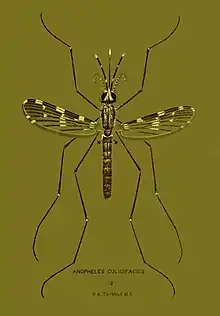Anopheles culicifacies
Anopheles culicifacies (sensu lato) is one of the major vectors of malaria on the Indian Subcontinent. It has been reported to be a species complex consisting of five sibling species which have been provisionally designated as species A, B, C, D, and E. It prefers to rest indoors in cattle sheds, where it feeds on cattle. The control of A. culicifacies has become a formidable task due to development of insecticide resistance against all commonly used insecticides, including new-generation insecticides such as synthetic pyrethroids.
| Anopheles culicifacies | |
|---|---|
 | |
| Scientific classification | |
| Kingdom: | |
| Phylum: | |
| Class: | |
| Order: | |
| Family: | |
| Genus: | |
| Species: | A. culicifacies |
| Binomial name | |
| Anopheles culicifacies Giles, 1901 | |
It has a Culex-like sitting posture.
The insect must complete an ovipositing dance before releasing its eggs to the water (for development). This dance requires a volume of space. Hence, if objects are in this space, then the mosquito does not lay its eggs. This is the reason for the lack of this mosquito species in regions with plenty of wheat. The wheat stalks prevent the mosquito from completing its ovipositing dance.
